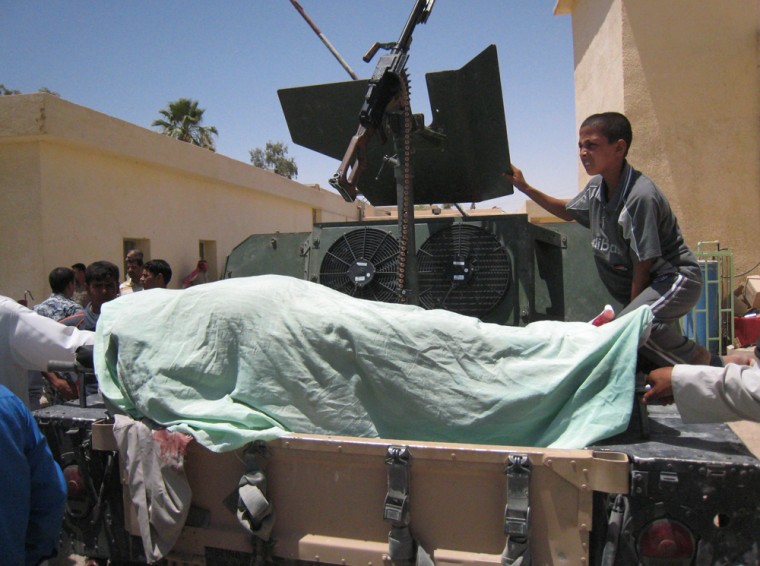The U.S. military said three American Marines and two interpreters were killed in an attack west of Baghdad in Anbar province, Thursday.
Iraqi police said the attack was carried out by a suicide bomber against a meeting of pro-government Sunni sheiks in the former insurgent stronghold and at least 20 Iraqis were killed as well.
The military statement gave the death toll but did not provide more details about the attack.
Anbar province has seen a steep decline in violence in the past year thanks to the Sunni revolt against al-Qaida in Iraq. But Thursday's attack underscores the fragility of the security gains.
At least 18 more people died Thursday in a car bombing in the northern city of Mosul, officials said. It appeared the target was the provincial governor, who was near the blast but escaped injury.
Both attacks occurred in Sunni Arab areas where al-Qaida in Iraq has been active. They appeared part of a campaign by both Sunni and Shiite extremists to undermine U.S. efforts to shore up local administrations and secure the security gains achieved since early last year.
Col. Fawzi Fraih, civil defense director of Anbar province, said dozens of sheiks had gathered in a building in Karmah, 20 miles west of Baghdad, for a meeting attended by U.S. officials when the bomber struck.
Local police Capt. Amir al-Jumaili said 20 Iraqis were killed and 20 others wounded.
Bomber wore police uniform
Two policemen said the bomber was able to penetrate security because he was a wearing camouflage uniform of the Iraqi police commandos. Both policemen spoke on condition of anonymity for security reasons.
The blast occurred only days before U.S. troops are to hand over security responsibility for Anbar to the Iraqis, marking a major milestone in the campaign to lower the U.S. profile in an area that had once been center-stage of the war.
Anbar sheiks spearheaded the Sunni revolt against al-Qaida, one of the key reasons behind the dramatic drop in both overall violence and American casualties since 2006.
The media office for Anbar province said the dead included the town's administrative director and at least two chiefs of major Sunni tribes in the area.
The bomb in Mosul went off between the government headquarters and a market, where the governor of surrounding Nineveh province, Duraid Kashmola, was inspecting damage from an earlier rocket attack, police said.
U.S. authorities said 18 people were killed and nearly 80 wounded — mostly civilians. Mosul is the scene of an ongoing Iraqi military operation against al-Qaida and other Sunni extremist groups.
The street where the blast occurred had been blocked with concrete barriers but was reopened about three weeks ago as part of a government move to improve the quality of life and undermine support for extremists.
'Like doomsday'
Adil Khalid, a 35-year-old grocer, said he went to the market to buy food from wholesalers when he saw a parked car explode about 100 yards away.
"It was like doomsday. People were panicked, running to escape," Khalid said. "Even policemen fled the scene but came back to evacuate the victims. I saw two or three bodies burned beyond recognition."
The two bombings were part of an uptick in violence that has pushed the monthly death toll for U.S. troops in Iraq to at least 26. That's well below figures of last year but an increase over the 19 who died in May, the lowest monthly tally of the war.
In all, at least 4,110 U.S. military service members have died in the Iraq war since it began in March 2003, according to an Associated Press count.
Ten people, including four Americans, were killed Tuesday in a bombing in a municipal council office in the Shiite area of Sadr City in Baghdad.
Two Americans were shot dead and four wounded Monday when a disgruntled official opened fire as they left a municipal building in Salman Pak about 15 miles south of the capital.
In a Web statement posted Thursday, the al-Qaida front group the Islamic State of Iraq claimed responsibility for a bombing that killed three American soldiers and their interpreter in Nineveh two days ago.
The statement said the attack was in retaliation for the killing of a Muslim family in Mosul.
The U.S. military says violence in Iraq has dropped to its lowest level in more than four years, but attacks are continuing as Sunni and Shiite extremists try to regroup and undermine security gains.
Also Thursday, the U.S. military said al-Qaida in Iraq's top leader in Mosul was killed during a raid this week in that northern city.
The "emir" of the terror movement in Mosul, known by his nickname Abu Khalaf, was killed along with two other extremists in a gunbattle Tuesday, the U.S. said.
One of those killed was a woman who was shot as she tried to detonate the explosive belt of one of her dead comrades, the statement said.
Associates identified one of the dead as Abu Khalaf, the statement added. It said the third extremist was a Syrian known by his nickname Abu Khalud.
According to the U.S., Abu Khalaf had been a deputy of Abu Musab al-Zarqawi, leader of al-Qaida in Iraq who was killed by a U.S. airstrike in Diyala province in June 2006.
U.S. officials say Mosul is the last major Iraqi city where al-Qaida has a significant presence.
